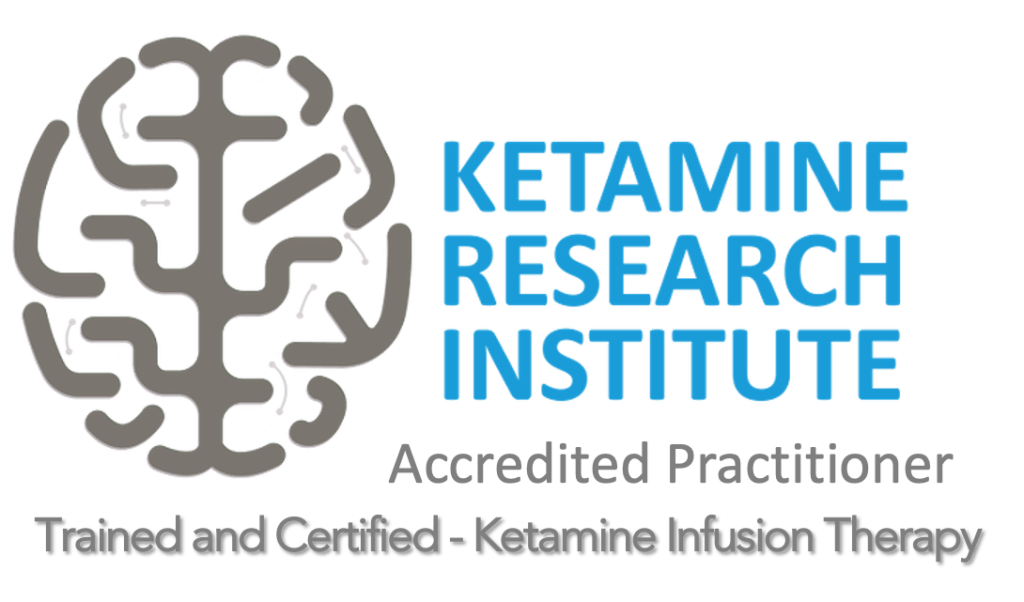Ketamine Therapy for Mood Disorders
Ketamine was initially developed as an anesthetic/analgesic in 1970. Experiments on its psychotherapeutic usages began 1973-74 and by the year 2000, Ketamine was found to be a treatment option for depression. Ketamine infusions became a viable treatment option for Mood Disorders in 2013 and research continues to take place with hopes that additional treatment conditions will be added in the future.
Here are some key points about Ketamine Therapy:
Treatment Conditions
Ketamine is currently approved as an anesthetic agent; however; it may be used off label to treat certain treatment resistant Mood Disorders such Depression, Bipolar Depression, Post-Traumatic Stress Disorder (PTSD), Obsessive Compulsive Disorder (OCD), Generalized Anxiety Disorder (GAD) and Substance Use Disorders (SUD). We also require you be under the care of a primary care physician and ideally a psychiatrist while being treated with Ketamine.

What Is Treatment Resistance
To be considered a candidate for Ketamine Therapy your condition must be considered treatment resistant. This means you have at least tried two medications of separate classes for a period of 8 weeks (each) and continue to have symptoms.
What Is Meant By Off-Label Usage
When a drug or device is approved for medical use by the Food and Drug Administration (FDA), the manufacturer produces a label to explain its use. Once a device/medication is approved by the FDA, physicians may use it off-label for other purposes if they are well-informed about the product, base its use on firm scientific method and sound medical evidence, and maintain records of its use and effects. When Ketamine infusion therapy is used to treat mood disorders; MDD, PTSD, GAD, OCD and/or SUD it is considered off label usage of the medication.
How Does Ketamine Treatment Differ
Traditional medications for mood disorders have historically focused on targeting monoamine neurotransmitters through methods such selective serotonin reuptake inhibitors (SSRI) or serotonin-norepinephrine reuptake inhibitors (SNRI). These treatments can take weeks (usually 6-8) to achieve optimal results however studies show only 1-2 out of 10 patients respond. Ketamine differs from SSRI & SNRI by acting on NMDA receptors allowing for a quicker response to treatment. These receptors have been found to have a broad spectrum of action allowing for a multi-faceted approach to mood disorders therefore increasing chance of treatment success. Ketamine works through its pharmacological and psychological effects; 75% of its therapeutic effect is derived though its pharmacology. Ketamine works my promoting neuroplasticity (rewiring of the brain), increasing serotonin, dopamine and norepinephrine levels, anti-inflammatory effects and potentially normalizes the gut microbiome (brain gut axis).

How Effective Is Treatment
There is a lot of misinformation regarding ketamine's efficacy. It is not a miracle therapy where one round of treatment is going to be able to cure your Mood Disorder. Studies suggest success rates with Ketamine varies from 20-50% which is defined as an improvement in symptoms. Majority of Ketamine clinicians utilize the same treatment protocol based on the original study done at Yale University. Breakdown of patient's response rate from the original study protocol showed that 33% of patients will be optimally dosed; 33% will be under-dosed; and 33% will be over-dosed which could account for the low response rates to treatment. Additionally, many clinicians have not undergone specific Ketamine training for Mood Disorders.
Can Treatment Success Be Improved
At Samsara, we follow a modified treatment protocol that was developed at the Ketamine Research Institute (KRI) in Florida and taught to Dr. Madahar during his Ketamine Therapy Training. This modified protocol allows for a customized approach to the treatment of Mood Disorders. We aim to target specific concentrations of Ketamine in your bloodstream by accounting for each patient's mass, morbidity, medications, metabolism and mindset. This tailored approach has seen treatment success rate of up to 75%.
How Do I Get Started
The first step is to schedule an appointment where an extensive history will be taken to determine if you are an ideal candidate for Ketamine Therapy. We ask that you bring a copy of your medical records for review; most importantly records pertaining to any prior psychiatric treatments. A consultation fee of $150 is due at time of consultation and this fee will be deducted from your first Ketamine treatment (if approved). Consultations may take up to 2 hours depending on the amount of history that needs to be reviewed. Treatments are priced at $450 per session with Healthcare Worker and Military discounts available.
How Long Does It Take Ketamine To Work
Unfortunately there is no standard time frame for Ketamine to start working but many patients start to have positive effects after several treatments. Given Ketamines ability to rewire the brain; healing can take time as the new positive pathways develop within the brain. Other drugs such as LSD, Psilocybin and DMT can also promote neuroplasticity; however; the positive effects are these drugs are largely based on the patient's experience. Additional the legality of these substances vary by state. As 75% of Ketamine's positive effect comes from reaching appropriate concentration levels this allows for results to be reproduced. A typical course of treatment consists of 6 sessions done over 2-3 weeks, followed by a booster session 4 weeks following your last infusion.



